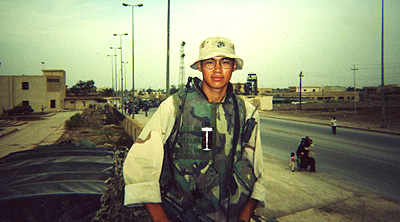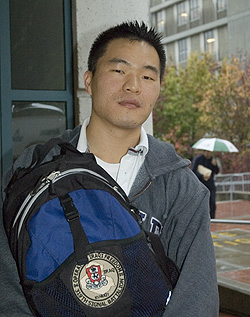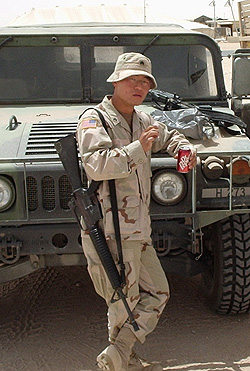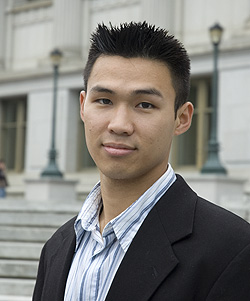UC Berkeley Web Feature
 |
UC Berkeley junior Ryan Tung on duty in the Iraq town where he was deployed as a Marine Reservist in mid-2003. |
No showers and giant rats: Two student veterans share their Operation Iraqi Freedom experiences
Bringing the war back to Berkeley |
BERKELEY – In the absence of a compulsory military draft, here at Berkeley - as in most of America - the Iraq war is primarily an abstract concept to be debated in terms of geopolitics, domestic security, and international human rights. Largely absent from the discussion is the everyday reality faced by U.S. soldiers deployed to the Middle East.
Yet sitting in the lecture halls and conference rooms of UC Berkeley are people who have served their country in Iraq and Kuwait. As a group, these veterans say they tend not to volunteer this information unless asked, which rarely happens.
"People don't ask straight up. Frankly, that would be more interesting," says U.S. Navy Captain David Buckey, the chairman of UC Berkeley's Military Affairs department and head of the campus's ROTC program. In March 2003, Buckey watched as the first Tomahawks were launched into Iraq from the USS Bunker Hill. "I think they would like to know more, hear a firsthand account - what you saw, what you were involved in - but they don't know how to ask. They consider it an intrusion."
According to Ehren Tool, M.A. '05 and Gulf War veteran, "Once a person has witnessed a war, they are forever changed." In this two-part series, the NewsCenter asked four veterans on campus - two students followed by two staff members - to share their experiences of Operation Iraqi Freedom. We are also interested in reading firsthand accounts, see below for details.
 'I think it's kind of funny that they've changed the reason for the war to being about liberty and democracy. But in Kuwait, it didn't matter whether we were for or against it — you have to do your job and get out.' -Jae Jin Yi, fourth-year economics major |
Jae Jin Yi:
Vehicle support sergeant in Kuwait
Jae Jin Yi's parents couldn't understand why he wanted to follow his brother into the U.S. military right after high school. In Korea, which the family left 10 years ago, military service was compulsory. "They couldn't figure out why I would volunteer if I didn't have to," says the taciturn Yi, now 26 and a fourth-year Berkeley economics major. "I'm not sure why I did, either; I guess to go out and see the world."
Although Yi would have preferred to join the Marines, his parents objected less strenuously to the Army, so he enlisted with the Army Reserves. After six months of Army training in 1998, he enrolled at De Anza Community College part time while juggling a number of jobs to help support his family, among them selling cars and luggage, and working for the Franchise Tax Board.
After the attacks of September 11, 2001, one of his superiors with the reserves called him to say, "You know what's coming; get ready," Yi recalls. But he was not activated until November 2003 - just one semester after he had transferred to UC Berkeley. "The university was great about it," says Yi. Out of the four classes he was taking when he was deployed, he was able to get at least partial credit for three. Yi was touched that several professors and staff stayed in touch with him by e-mail, including Sandy Jager, Martha Olney, Glenn Woroch, and Lee Friedman, who's a Vietnam veteran.
After training stints in Texas and leadership classes in Germany, Sergeant Yi was sent to Kuwait with the 319th Signal Battalion in March 2004, a year after the U.S. first invaded Iraq. There, he was an assistant to the platoon sergeant, coordinating and overseeing the maintenance and repair of vehicles used for transporting supplies, fuel, parts, and personnel to and from bases in Kuwait and Iraq. The responsibilities of his six-day work week were grueling: "I was so stressed out while I was over there that I gained a lot of white hairs," says Yi.
The hardest part was managing the enlisted service members who reported to him. "When people would show up late for work, or unshaved - not up to the Army's standards - I had to tell them, 'You can't do that. Shape up.'"
 Jae Jin Yi on break from his responsibilities in Kuwait, where he oversaw vehicle repair and maintenance. |
Yi lived in an air-conditioned canvas tent with seven other soldiers, assorted scorpions, and a large rodent population. "I woke up once thinking I felt something. A giant rat was nibbling on my hair!" Yi grimaces. "I didn't really sleep well ever again after that."
Asked whether going to war changed him, Yi says that it shifted his views on the politics behind the Iraq war. "From the get-go I believed President Bush was an honest man, very patriotic," he says. "Then they admitted that they miscalculated, that there were no weapons of mass destruction. I think it's kind of funny that they've changed the reason for the war to being about liberty and democracy. But in Kuwait, it didn't matter whether we were for or against it - you have to do your job and get out."
Even though he opposes the reasons for starting the war, "we have to finish it," he says. While he was in Kuwait, half of Yi's company was sent to Iraq, and he volunteered to go with them. "I figured I was this close, I might as well go all the way," he explains with a shrug. "But my platoon sergeant wouldn't let me; he needed me in Kuwait."
Yi returned from Kuwait three days short of a year in March 2005. After traveling around Europe, he came back to Berkeley for the fall semester. He is close to having enough credits to graduate in May 2006, or shortly thereafter with a summer school course. When Yi's eight-year Army contract is up in July 2006, he won't be renewing, despite a hefty, $15,000 tax-free re-signing bonus the military dangled in front of him.
That doesn't mean he won't consider going back to Kuwait - and maybe even Iraq - after he graduates. "I met some civilian contractors for Halliburton who had a free apartment to live in, free rental cars, and they seemed to be having a lot of fun. They were protected by the Army, but they didn't have to follow all the rules, and they were making three times as much as we were," Yi says.
"The Army has been an experience, for sure. I wanted to push myself, and I did. But I figure if I have to go back, I'm going back as a contractor."
 'I always had a premonition that I would end up in the desert. When you read history, you realize that superpowers don't commit huge numbers of troops then pull back.' -Ryan Tung, third-year political
science major |
Ryan Tung:
Boots-on-the-ground grunt in Iraq
Ryan Tung couldn't take a shower for his first month in Iraq. "It was extremely hot. We had water bottles and baby wipes," says the affable third-year transfer student from Foothill College, raising an eyebrow. "I'll leave the rest to your imagination."
Tung, who was living with his uncle in Mountain View, California, joined the Marine Corps Reserves in June 2001, right after high school as Yi had. He saw it as the only way he could afford college, and didn't waver from that commitment even after the terrorist attacks of September 11 that year changed the reservist landscape dramatically. "I always had a premonition that I would end up in the desert," he says. "When you read history, you realize that superpowers don't commit huge numbers of troops then pull back."
Now 22, Tung was a "straight-up grunt, boots-on-the-ground infantry" deployed to Iraq in late April 2003, a month after the U.S. invasion. He had been activated in January and was doing desert training exercises at the Marine Corps base Twenty-Nine Palms in southern California when his unit received news that the war had started.
"We couldn't believe they went without us," Tung recalls. ( "Jarhead," a movie about Marines marooned by inactivity during 1991's Desert Storm, "really resonated with me," he says.)
Berkeley alum dies in Iraq accident If you know of other Berkeley alumni who have died while serving in Iraq and would like us to add their names to this article, please send a brief account with identifying information to this email address. |
Once in Iraq, Tung was stationed in Al Kut, a town between Baghdad and An Nasiriyah, then after two months moved to a small, relatively tranquil town along the Iranian border. His unit took one casualty: a Marine in his platoon — a student on leave from UC Davis — was shot during a raid in May 2003 and awarded the Purple Heart a month later.
Tung spent one long day after another patrolling the dusty town on foot and standing guard on post. "A lot of people, including me, had this sense of disbelief about being there at first," he recalls. "This denial lasted until the finality dawned on us that we would be shot at." His unit had no translator for the first month, and Tung's Arabic was limited to the words "stop," "no," and "thank you." The support system was also not yet in place: they ate a lot of MREs (freeze-dried Meals Ready to Eat) and with no electricity at night, had nothing to do but play cards. There was one laptop for the whole company to share to check e-mail.
"You lose all sense of time," Tung says. "Life was quite monotonous, broken up by special raids to snatch a guy or quell a riot." Those raids were the scariest part of his tour: "The moment before we'd go off on a mission, you'd be filled with the uncertainty over what you might encounter."
In Iraq, despite all the time on their hands, politics were not a frequent topic of discussion among the grunts. A senior Marine told them at one point, "It doesn't matter why you're here. You are here," recalls Tung.
Tung returned to the States in September 2003 and enrolled at Foothill the following spring, where he began to take classes in international relations and discovered he was keenly interested in political science, now his major at UC Berkeley. He campaigned actively for Senator John Kerry in the 2004 elections, "because I felt like the president should be someone who's been to war."
But transferring to Berkeley, somewhat surprisingly, has made him more conservative, not less, Tung says: "Here everything is black and white, and people make you pick one side." He tends to keep his military service to himself, in order to avoid being drawn into others' "pet conclusions" or assumptions, although he will talk about it when asked.
Tell us what you think |
Tung thinks neither President Bush's "stay the course" message nor Congressman John Murtha's and others' "get out now" advice are appropriate. "It's not that simple," he says. "Despite the war's dubious beginnings, we can't just abandon the country. It's like what Colin Powell said - 'We broke it; we can't just leave a mess.' We have to make sure Iraq is stable and won't fall into civil war."
Asked whether his wartime service changed him at all, he nods. "I've become more cynical about the way the world works, taking a more Hobbesian, dog-eat-dog view," he says slowly. "I don't think Americans realize that it takes blood to maintain our way of life. I hope the Iraqis can have a democracy and eventually stand on their own. I hope we weren't there just for the oil."
Related stories:
- "Alumnus Maurer heads Seabees in Iraq conflict," Winter 2005 Forefront story from the College of Engineering
- "Boots on the ground," August 29, 2005, Engineering News story about an engineering student likely to be deployed to Iraq
- "From jarhead to bowl maker: Grad student Ehren Tool's art of war," October 27, 2004, UC Berkeley NewsCenter story on a 1991 Gulf War veteran and ceramicist
- "Berkeley and the ROTC: Enrollment is climbing, and student attitudes are shifting," October 11, 2002, UC Berkeley NewsCenter story


 My
mother has brought the Iraq war home to millions
of Americans — but especially to me
My
mother has brought the Iraq war home to millions
of Americans — but especially to me "We
had no notions of being heroes
… we missed normalcy"
"We
had no notions of being heroes
… we missed normalcy" "We're
going to be doing these things for a long time"
"We're
going to be doing these things for a long time" No
showers and giant rats
No
showers and giant rats Ayman
Taha, economics '97 and a Special Forces servicemember, was
killed in Iraq on December 30, 2005. According to news reports,
Taha was working with munitions for demolition when they unexpectedly
exploded. Taha was born in Sudan, into an accomplished Muslim
family that later settled in Northern Virginia. He left the
University of Massachusetts in 2002 to enlist — only a few
months shy of getting his doctorate in economics — telling
family he wanted a break from studying and to fulfill
what he saw as his patriotic duty. He hoped someday to work
toward improving economic conditions in Africa. For more about
Taha, read the UMAss
Republican coverage.
Ayman
Taha, economics '97 and a Special Forces servicemember, was
killed in Iraq on December 30, 2005. According to news reports,
Taha was working with munitions for demolition when they unexpectedly
exploded. Taha was born in Sudan, into an accomplished Muslim
family that later settled in Northern Virginia. He left the
University of Massachusetts in 2002 to enlist — only a few
months shy of getting his doctorate in economics — telling
family he wanted a break from studying and to fulfill
what he saw as his patriotic duty. He hoped someday to work
toward improving economic conditions in Africa. For more about
Taha, read the UMAss
Republican coverage.
 "I
know Berkeley is a place where most people don't know anyone
in the military, but we are out there," wrote alum Lisa
J. Olsen, '83. We're posting comments on this series sent via
e-mail to
"I
know Berkeley is a place where most people don't know anyone
in the military, but we are out there," wrote alum Lisa
J. Olsen, '83. We're posting comments on this series sent via
e-mail to